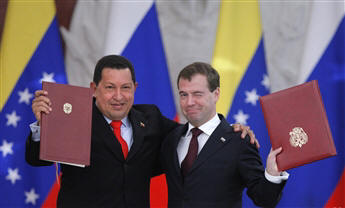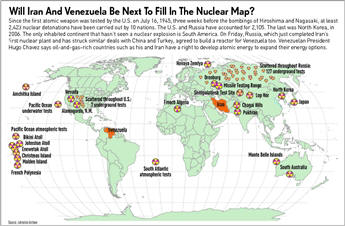Memo To Moscow: Not Our Backyard
National Security: Russia has agreed to help the regime in Venezuela enter the atomic age by building the country's first nuclear power plant. Will someone please remind Moscow the Monroe Doctrine has not lapsed?
In 1823, President Monroe told Congress in his yearly address to lawmakers that any attempts by European nations to interfere in the Western Hemisphere would be considered a threat to U.S. security. In other words, bloody Europe and its wars would not be welcome in America's backyard. We're staying out of your affairs, Monroe was saying to the old Continent, and we expect you to stay out of ours.
The doctrine has been invoked by the U.S. several times, perhaps most famously by President Kennedy, who said during the 1962 Cuban Missile Crisis that "this country will do whatever must be done to protect its own security and that of its allies."
Soviet Premier Nikita Khrushchev said two years before he sent missiles to Cuba that the doctrine was dead and "should best be buried, as every dead body is, so that it does not poison the air by its decay." Almost half a century later, Russian President Dmitry Medvedev is channeling Khrushchev.
In a meeting Friday at the Kremlin, Medvedev and Venezuelan President Hugo Chavez agreed that Russia would build two nuclear reactors somewhere in oil-rich Venezuela, which is on one of only two continents that hasn't had a nuclear explosion. (The other is Antarctica.) The arrangement follows Russia's deep involvement with the construction of a nuclear power plant in Iran, another nation hostile to the U.S. that is flush in fossil fuels.
A nuclear power plant and nuclear missiles aren't the same. But the technical know-how and materials needed to harness a nuclear reaction to generate electricity aren't far removed from the knowledge and resources needed to build atomic weapons.
It's called dual-use technology. A facility that can enrich fissionable material for generating electricity can enrich that same substance to a weapons-grade level. In a single month, for instance, a 1,000-megawatt nuclear power plant produces enough plutonium to make more than three atomic weapons.
Clearly this Russo-Venezuelan agreement is no harmless energy deal. It's intended to be a sharp stick in the eye of America. Venezuela has abundant energy and needs a nuclear power plant in the same way Alaska needs more snow. This is a direct challenge to the global order, which the U.S. sits atop, and a show for the folks at home.

Venezuela's Hugo Chavez, left, and
Russia's Dmitry Medvedev embrace after
reaching a deal in Moscow to build
Venezuela's first nuclear plant.
Medvedev, who committed earlier this year to selling Chavez an additional $5 billion in arms after already selling him $4 billion in weaponry, made this clear in defending the accord.
"Russia and Venezuela staunchly support the creation of modern and fair world order, so that our future doesn't depend on the will and the liking of just one country, its welfare and mood," he said.
That one country to which Medvedev alludes had better pay attention to what Russia is doing in its hemisphere. It's enough that Moscow has nurtured an alliance with Iran halfway across the world. Expanding its ties with Venezuela through a nuclear power agreement takes the attempt to inflame and interfere to a new level.
In the last two years, we've moved toward actual appeasement of Russia by agreeing not to deploy a missile defense system in Eastern Europe; signing an arms deal that, for the first time, linked our nuclear arsenals and missile defense; and looking the other way as Russia continued its occupation of Georgia.
All of this was done in an effort to "reassure" Russia and push the "reset button" in our relations with them. Well, it hasn't worked.
Isn't it time we let President Medvedev know that our relationship is a two-way street? And that the Monroe Doctrine isn't dead?
The U.S. needs to tell the Russians to stop meddling in the Western Hemisphere — or face a much more aggressive U.S. presence in central Asia and Eastern Europe. It's their choice.


